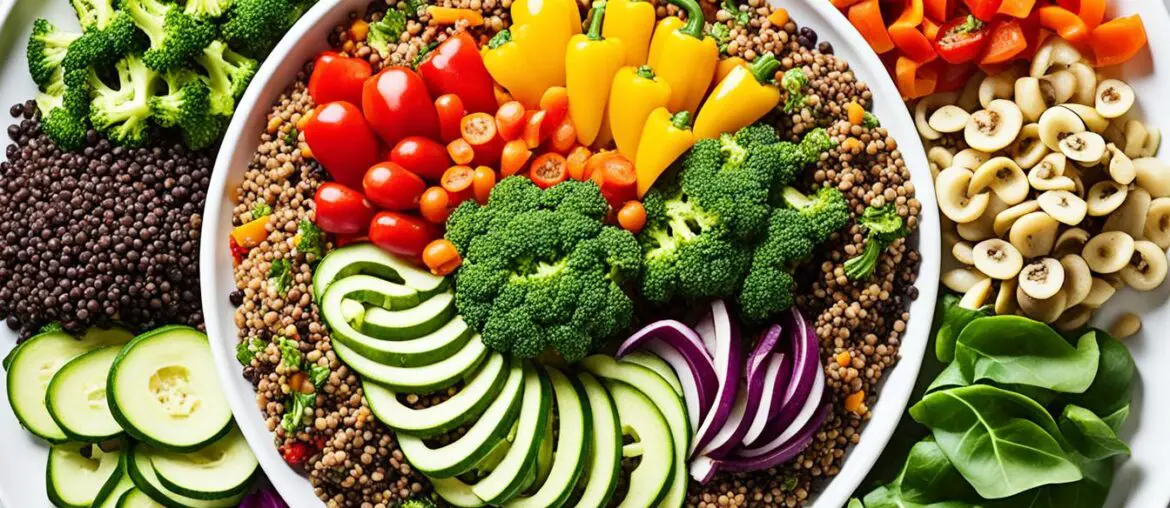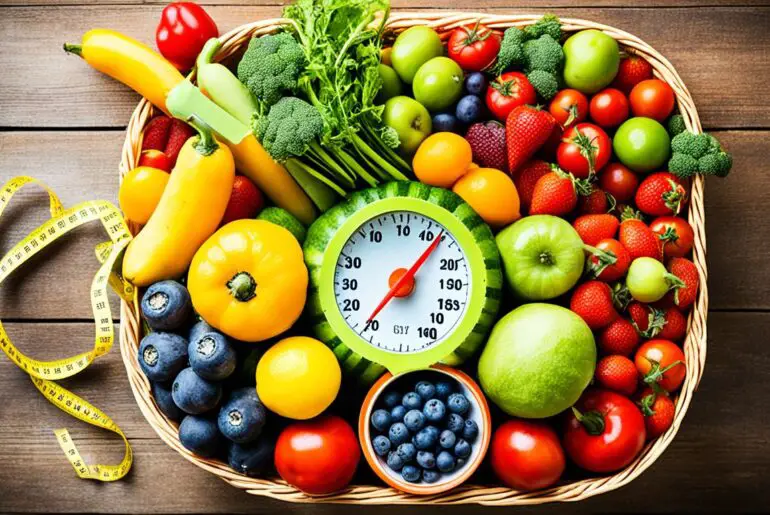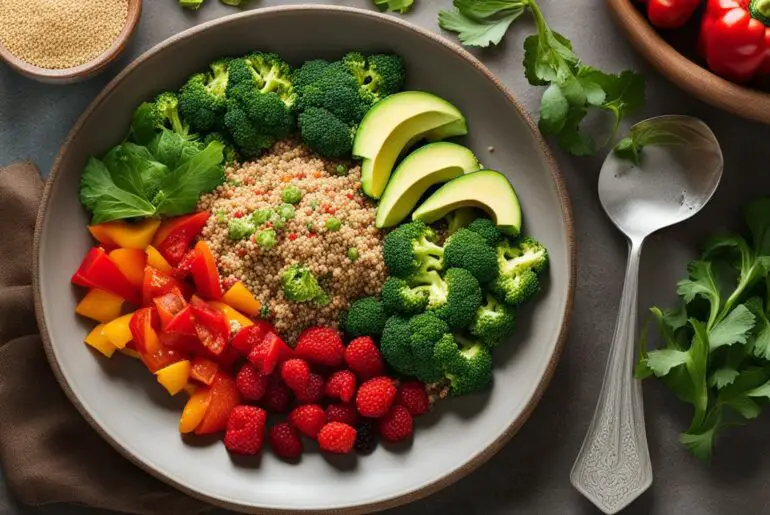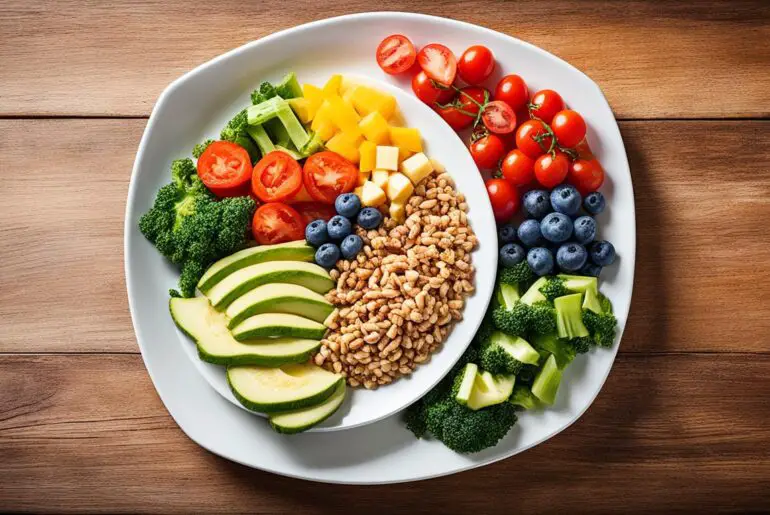Are you a vegetarian considering the HCG diet but concerned about its emphasis on animal protein? You’re not alone. Many vegetarians find it challenging to navigate the diet’s requirements while adhering to their plant-based lifestyle. However, there are alternatives and substitutions that vegetarians can make to meet their protein needs on the HCG diet. Let’s explore how you can successfully follow the HCG diet as a vegetarian without compromising your dietary principles.
Key Takeaways:
- Vegetarians can successfully follow the HCG diet by making appropriate substitutions and meal planning.
- Understanding the different types of vegetarian diets is crucial for choosing suitable protein substitutes.
- Protein alternatives for vegetarians on the HCG diet include organic milk, tofu, cottage cheese, and eggs.
- The vegetarian HCG diet plan consists of three main phases: loading, weight loss, and maintenance.
- Stocking up on essential groceries like cottage cheese, tofu, legumes, and eggs is vital for the vegetarian HCG diet.
Types of Vegetarian Diets
When it comes to following the HCG diet while adhering to a vegetarian lifestyle, understanding the different types of vegetarian diets is essential. These diets include:
- Vegan: Vegans avoid consuming any animal products, including meat, poultry, fish, dairy, and eggs. This means that on the HCG diet, vegans need to focus on plant-based protein sources.
- Lacto-vegetarian: Lacto-vegetarians include dairy products in their diet but exclude eggs, meat, poultry, and fish. This type of vegetarian diet allows for some additional protein options.
- Lacto-ovo vegetarian: Lacto-ovo vegetarians include both dairy products and eggs in their diet but avoid meat, poultry, and fish. This type of vegetarian diet offers a wider variety of protein sources.
Each type of vegetarian diet requires specific substitutions and adjustments to meet the protein requirements of the HCG diet. By understanding the nuances of these diets, vegetarians can create meal plans that are both HCG-compliant and vegetarian-friendly.
If you’re unsure which type of vegetarian diet you follow, consult with a healthcare professional or a registered dietitian who specializes in vegetarian nutrition to ensure you make appropriate choices on the HCG diet.
Protein Substitutes for Vegetarians on the HCG Diet
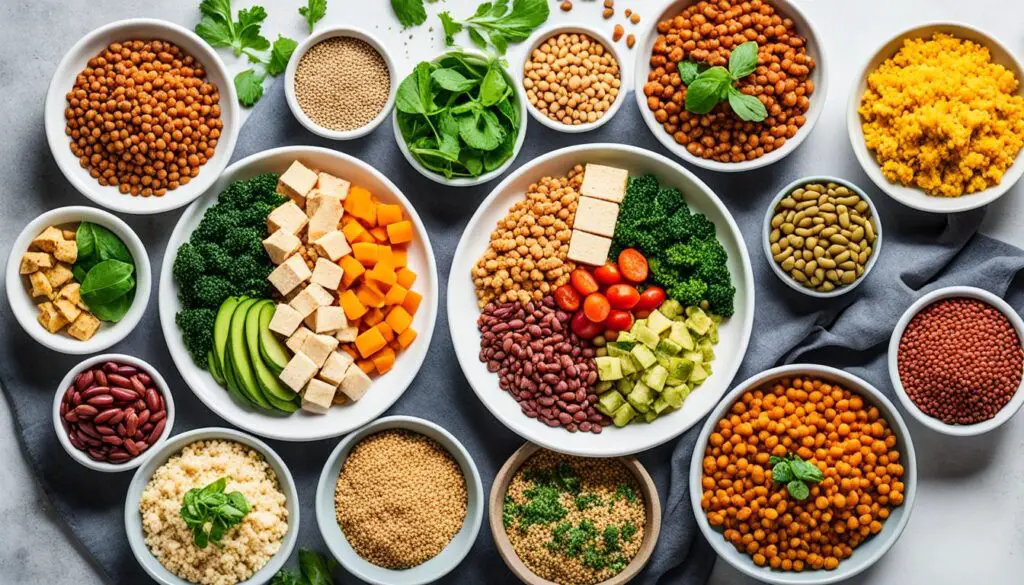
One of the main challenges for vegetarians on the HCG diet is finding protein substitutes for meat. Nuts and legumes, which are often go-to sources of protein for vegetarians, are high in fat and calories, making them unsuitable for the calorie-restricted nature of the HCG diet.
However, there are alternatives that vegetarians can incorporate into their HCG diet to meet their protein needs without compromising the requirements of the diet. Some suitable protein substitutes include:
- Organic milk: Organic milk is an excellent source of protein and can be consumed in moderation on the HCG diet. When using organic milk, it’s essential to choose low-fat or skim options to minimize fat and calorie intake.
- Tofu: Tofu is a versatile vegetarian protein option. It can be baked, grilled, or stir-fried to add variety to your HCG diet meals. Tofu is low in fat and calories while providing a good amount of protein.
- Cottage cheese: Cottage cheese is a high-protein food that can be enjoyed on the HCG diet. Choose low-fat or fat-free varieties to keep the calorie and fat content in check.
- Eggs: Eggs are an excellent source of protein and can be a valuable addition to the vegetarian HCG diet. They can be prepared in various ways, such as boiled, poached, or scrambled, to add variety to your meals.
By including these protein substitutes in their HCG diet menu, vegetarians can ensure adequate protein intake while staying within the calorie restrictions. Remember to consult with a healthcare professional or registered dietitian for personalized guidance and recommendations for protein substitutes that align with your specific dietary needs and goals.
Vegetarian HCG Diet Plan
The vegetarian HCG diet plan follows the same structure as the regular HCG diet, with a few substitutions. It consists of three main phases: the loading phase, the weight loss phase, and the maintenance phase. Each phase has specific guidelines and food choices outlined to support weight loss while meeting the requirements of a vegetarian diet.
Phase 1: Loading Phase
In this phase, the focus is on consuming high-calorie foods to build up fat stores. While the regular HCG diet recommends fatty meats, vegetarians can incorporate vegetarian-friendly options such as avocado, nuts, and seeds into their diet. This phase typically lasts for two days.
Phase 2: Weight Loss Phase
The weight loss phase is the most crucial part of the HCG diet. It involves a calorie-restricted diet combined with hormone injections. For vegetarians, the challenge lies in finding protein substitutes for meat. However, there are plenty of options available, such as organic milk, tofu, cottage cheese, and eggs, which provide the necessary protein without compromising the diet’s requirements. During this phase, it’s important to focus on consuming low-calorie vegetables, fruits, and vegetarian protein sources.
Phase 3: Maintenance Phase
After reaching the desired weight loss goals, the maintenance phase begins. This phase aims to stabilize weight loss and gradually reintroduce sugars and starchy foods. Vegetarians can continue following the regular guidelines for this phase, focusing on maintaining a balanced diet and incorporating vegetarian-friendly options. It’s essential to consult with a healthcare professional or registered dietitian to personalize the vegetarian HCG diet plan based on individual needs.
By following the vegetarian HCG diet plan and making appropriate substitutions, vegetarians can achieve weight loss while maintaining their vegetarian lifestyle. The key is to ensure adequate protein intake and adhere to the specific guidelines of each phase. Now let’s take a look at some delicious vegetarian HCG diet recipes in the next section!
| Phases | Focus | Guidelines and Food Choices |
|---|---|---|
| Phase 1: Loading Phase | Build up fat stores | High-calorie vegetarian options like avocado, nuts, and seeds |
| Phase 2: Weight Loss Phase | Calorie-restricted diet | Vegetarian protein substitutes (organic milk, tofu, cottage cheese, eggs), low-calorie vegetables, fruits |
| Phase 3: Maintenance Phase | Stabilize weight loss | Gradual reintroduction of sugars and starchy foods, balanced vegetarian diet |
Essential Groceries for Vegetarian HCG Diet
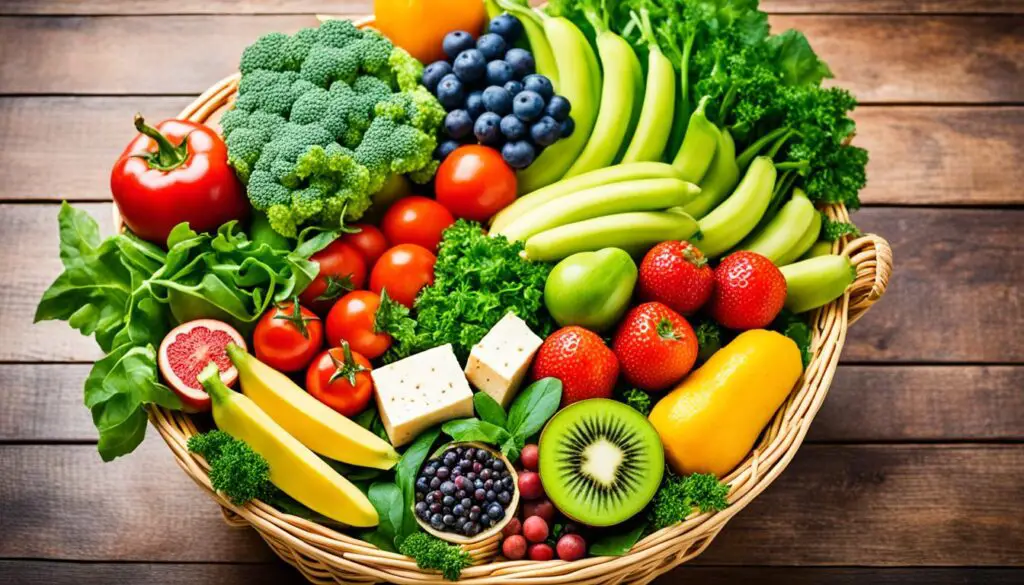
To successfully follow the vegetarian HCG diet, it’s important to stock up on essential groceries that align with the diet’s guidelines. These groceries can provide the necessary protein while following the calorie restrictions of the HCG diet. Some key options include:
- Cottage Cheese
- Tofu
- Legumes (such as soy and pea protein)
- Eggs
These vegetarian-friendly options are rich in protein and can be incorporated into a variety of dishes to add flavor and nutrition to your meals. Whether you’re looking for a creamy cottage cheese snack, a protein-packed tofu stir-fry, or a hearty legume-based soup, these essential groceries will help you stay on track with your vegetarian HCG diet plan.
By including these protein-rich options in your grocery list, you can ensure that you’re meeting your dietary needs while following the vegetarian-friendly HCG diet. Remember to choose organic and high-quality products whenever possible to maximize the nutritional value of your meals.
Phases of the Vegetarian HCG Diet
The vegetarian HCG diet follows a structured approach with three distinct phases: the loading phase, the weight loss phase, and the maintenance phase. Each phase has its specific guidelines and meal plans designed to support the vegetarian diet while facilitating weight loss and long-term success.
Loading Phase
The loading phase is the initial stage of the vegetarian HCG diet. During this phase, individuals consume high-calorie, calorie-dense foods to build up fat stores in preparation for the subsequent weight loss phase. While it may seem counterintuitive to consume more calories at the beginning of a diet, this phase is essential for ensuring the body has adequate energy reserves to rely on during the low-calorie phases that follow.
During the loading phase, vegetarians can choose from a variety of vegetarian-friendly options, such as avocados, nuts, seeds, and plant-based oils. These foods provide high levels of healthy fats to support satiety and energy levels during the weight loss phase.
Weight Loss Phase
The weight loss phase is the most critical part of the vegetarian HCG diet. It involves a strict caloric restriction combined with the administration of HCG hormone injections or oral drops. This phase typically lasts for a specific duration, usually ranging from 21 to 42 days, depending on individual goals and guidelines provided by healthcare professionals.
Throughout the weight loss phase, vegetarians must carefully follow the prescribed meal plan, which emphasizes low-calorie vegetarian foods such as leafy greens, non-starchy vegetables, lean proteins like tofu and tempeh, and approved fruits. The meal plan should be rich in nutrients, providing essential vitamins, minerals, and sufficient protein to support overall health and prevent muscle loss.
Maintenance Phase
The maintenance phase of the vegetarian HCG diet is the final stage and focuses on stabilizing the weight loss achieved during the preceding phases. This phase helps individuals transition back to a regular, healthy diet while maintaining their new weight. It is crucial to follow the specific guidelines provided by healthcare professionals during this phase to ensure successful weight maintenance.
During the maintenance phase, vegetarians should gradually reintroduce additional food groups and increase calorie intake while maintaining a balanced and nutritious diet. This phase helps to reset the metabolism and establish long-term healthy eating habits.
It is important to note that the duration of each phase may vary based on individual circumstances and healthcare professional recommendations. It is always recommended to consult with a healthcare professional before starting any diet or weight loss program.
In the next section, we will explore the vegetarian HCG diet meal plan in detail, providing a range of delicious and nutritious options for breakfast, lunch, and dinner.
Vegetarian HCG Diet Meal Plan
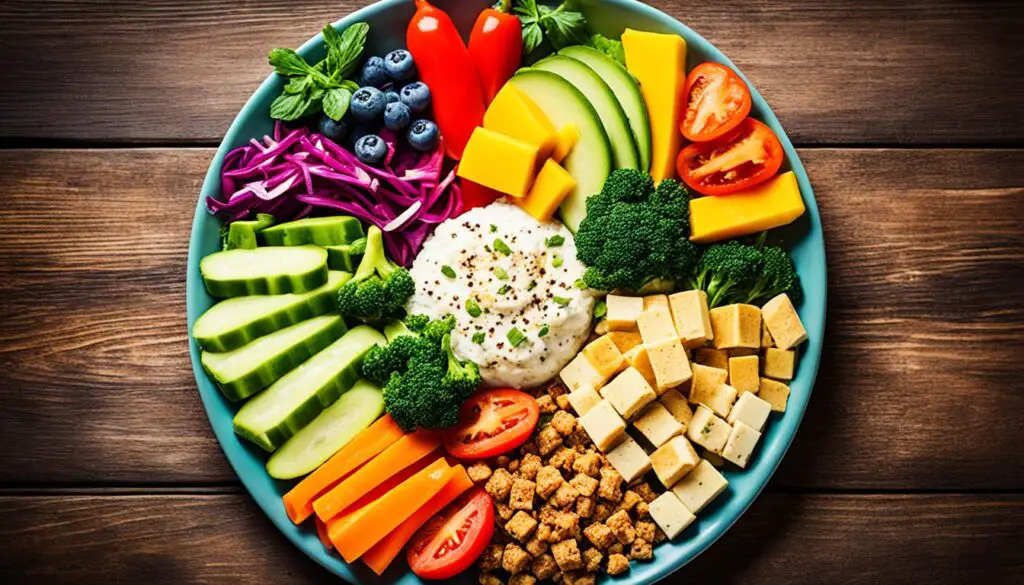
When following the vegetarian HCG diet, it’s important to have a well-planned meal plan that meets your nutritional needs and supports weight loss. The vegetarian HCG diet meal plan is similar to the regular HCG diet, with necessary substitutions for animal proteins. Here’s a breakdown of the meal options for breakfast, lunch, and dinner:
Breakfast Options
- Vegetarian omelet with spinach, mushrooms, and peppers
- Greek yogurt with berries and a sprinkle of nuts
Lunch Options
- Grilled tofu or tempeh with mixed vegetables
- Chickpea salad with a variety of colorful vegetables
Dinner Options
- Lentil curry with cauliflower rice
- Quinoa stuffed bell peppers
It’s important to include a balance of protein, vegetables, fruits, and carbs in your meals to ensure proper nutrition and adherence to the HCG diet. Diversify your meals by choosing from a variety of vegetarian sources like tofu, legumes, and whole grains. Remember to follow the portion recommendations and calorie restrictions outlined in the HCG diet guidelines.
For a complete and detailed vegetarian HCG diet meal plan, refer to the table below:
| Day | Breakfast | Lunch | Dinner |
|---|---|---|---|
| Day 1 | Vegetarian omelet | Grilled tofu with mixed vegetables | Lentil curry with cauliflower rice |
| Day 2 | Greek yogurt with berries and nuts | Chickpea salad | Quinoa stuffed bell peppers |
| Day 3 | Vegetable smoothie | Black bean burger with lettuce wrap | Eggplant lasagna with zucchini noodles |
| Day 4 | Scrambled tofu | Veggie stir-fry with tofu | Vegetarian chili |
| Day 5 | Spinach and mushroom frittata | Lentil soup | Cauliflower fried rice |
Follow the provided vegetarian HCG diet meal plan, and make sure to consult with a healthcare professional before starting the diet for personalized advice and support. With the right planning and dedication, you can successfully achieve your weight loss goals while following a vegetarian lifestyle.
After the Vegetarian HCG Diet
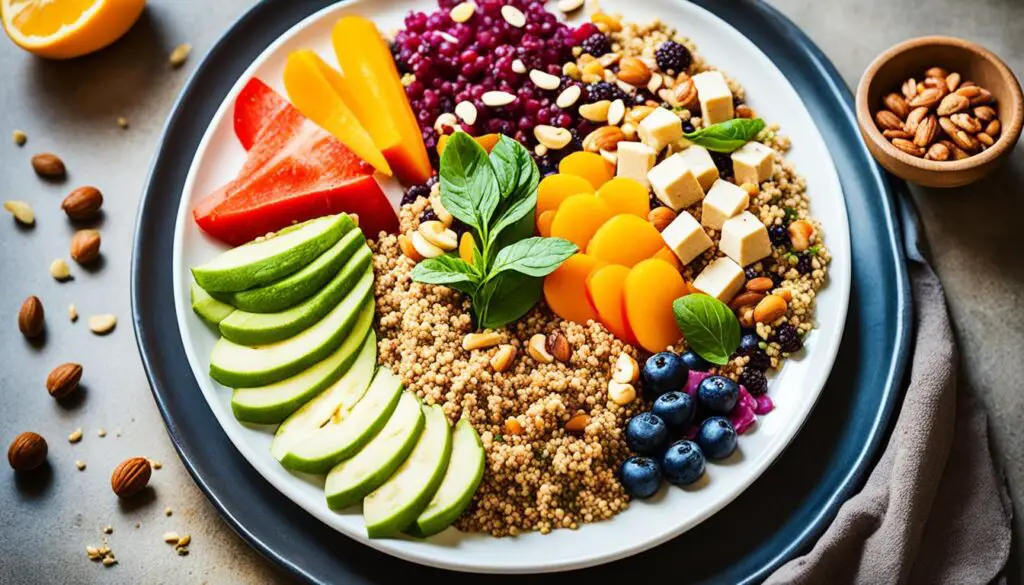
Once you have successfully completed the vegetarian HCG diet, it’s crucial to continue prioritizing a healthy lifestyle to maintain your weight loss results. While you may have achieved your goal weight, it’s important to remember that the process of resetting your metabolism may take several months.
Gradually reintroducing sugars and starchy foods into your diet is recommended after completing the HCG diet. This gradual approach allows your body to adjust and prevents potential weight gain. It’s essential to follow post-diet guidelines and consult a healthcare provider for personalized advice and support.
Here are some key tips to help you maintain your vegetarian-friendly HCG diet results:
- Continue eating a balanced diet: Stick to a diet that includes a variety of vegetarian-friendly protein sources, such as tofu, cottage cheese, and eggs. Incorporate plenty of vegetables, fruits, and whole grains for vital nutrients.
- Monitor portion sizes: Even though you have completed the HCG diet, maintaining portion control is important for weight management. Be mindful of your calorie intake and listen to your body’s hunger cues.
- Stay physically active: Regular exercise plays a significant role in weight maintenance. Aim for at least 150 minutes of moderate-intensity aerobic activity per week, along with strength training exercises.
- Stay hydrated: Drinking enough water is essential for overall health and can also help control your appetite. Aim to drink at least eight glasses of water per day.
- Stay accountable: Keep track of your progress by monitoring your weight and measurements regularly. This can help you identify and address any fluctuations in a timely manner.
“Maintaining a healthy lifestyle post-diet is vital for sustaining your weight loss results and overall well-being. Remember to give yourself grace and be patient as your body adjusts to its new metabolic state.”
— Dr. Jessica Bennett, Registered Dietitian
By following these tips and integrating them into your daily routine, you can effectively maintain the positive results you achieved through the vegetarian HCG diet. Remember, the key is to focus on long-term sustainability and make healthy choices that work for you.
Continue to prioritize your health and well-being, and consult with a healthcare professional for personalized guidance and support throughout your post-diet journey.
Conclusion
The HCG diet offers vegetarian individuals the opportunity to follow a successful weight loss plan by making appropriate substitutions and implementing careful meal planning. By incorporating vegetarian protein sources into their meals and adhering to the guidelines of the HCG diet, vegetarians can achieve their desired weight loss goals while maintaining nutritional balance.
It is important for vegetarians on the HCG diet to consult with a healthcare professional who can provide personalized advice and support throughout their diet journey. This will help ensure that they are meeting their nutritional needs and making informed choices that align with their specific dietary preferences.
With the right approach, vegetarians can find a wide range of options that are compatible with the HCG diet. By exploring vegetarian-friendly recipes, incorporating protein substitutes such as organic milk, tofu, cottage cheese, and eggs, and following the phases and meal plans designed for vegetarians, individuals can successfully navigate their way through the HCG diet and achieve their weight loss goals.
FAQ
What is the HCG diet?
The HCG diet is a low-calorie regimen combined with hormone injections to support weight loss.
Why is the HCG diet challenging for vegetarians?
The HCG diet emphasizes animal protein, which can be a challenge for vegetarians who do not consume meat.
What are the types of vegetarian diets?
The types of vegetarian diets include vegan, lacto-vegetarian, and lacto-ovo vegetarian.
What are protein substitutes for vegetarians on the HCG diet?
Vegetarian options for protein on the HCG diet include organic milk, tofu, cottage cheese, and eggs.
What is the vegetarian HCG diet plan?
The vegetarian HCG diet plan follows the same structure as the regular HCG diet but with substitutions for animal proteins.
What groceries are essential for the vegetarian HCG diet?
Essential groceries for the vegetarian HCG diet include cottage cheese, tofu, legumes, and eggs.
What are the phases of the vegetarian HCG diet?
The phases of the vegetarian HCG diet include the loading phase, the weight loss phase, and the maintenance phase.
What is the vegetarian HCG diet meal plan?
The vegetarian HCG diet meal plan includes options for breakfast, lunch, and dinner, with specific recommendations for protein, vegetables, fruits, and carbs.
What should I do after completing the vegetarian HCG diet?
After completing the vegetarian HCG diet, it’s important to continue maintaining a healthy lifestyle and follow post-diet guidelines for long-term success.
Can vegetarians follow the HCG diet successfully?
Yes, vegetarians can successfully follow the HCG diet by making appropriate substitutions and following the guidelines of the vegetarian HCG diet plan.

